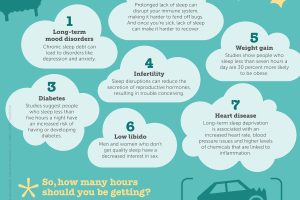The Power of Rest and Recovery: Why Sleep is Essential for a Healthy Lifestyle

Understanding the Importance of Rest and Recovery
In today’s fast-paced world, the concepts of rest and recovery often take a backseat to endless to-do lists and busy schedules. Many people believe that productivity is a result of constant activity, but research shows that this couldn’t be further from the truth. Rest and recovery are essential components for maintaining physical health, mental well-being, and overall effectiveness in daily activities. Consider the professional athlete; their rigorous training regimens are balanced with ample rest periods. This strategic approach allows their bodies time to recover and grow stronger. Similarly, in everyday life, prioritizing rest can help us recharge and tackle challenges head-on. Here are some key benefits of rest and recovery:
- The Power of Rest and Recovery: Why Sleep is Essential for a Healthy Lifestyle
- Understanding the Importance of Rest and Recovery
- The Relationship between Sleep and a Healthy Lifestyle
- The Science Behind Sleep
- Stages of Sleep
- Benefits of Deep Sleep
- Effects of Sleep Deprivation
- Impact on Physical Health
- Influence on Mental Well-Being
- The Role of Sleep in Recovery
- Muscle Repair and Growth
- Cognitive Function Restoration
- Tips for Improving Sleep Quality
- Creating a Relaxing Bedtime Routine
- Implementing a Consistent Sleep Schedule
- Enhanced Performance: Just like athletes, individuals engaged in physically demanding jobs benefit from appropriate recovery time.
- Mood Regulation: Rest has been linked to improved emotional resilience, helping to manage stress and anxiety.
- Increased Focus: Proper recovery enhances cognitive functions, ensuring improved productivity and decision-making.
The Relationship between Sleep and a Healthy Lifestyle
Sleep acts as a cornerstone of a healthy lifestyle, impacting everything from physical health to emotional stability. Individuals often underestimate the power of a good night’s sleep, yet studies show that quality rest can directly affect one’s overall health trajectory. Personal experiences often illustrate this connection vividly. For instance, someone who consistently sacrifices sleep for work may soon find themselves grappling with fatigue, irritability, and even weight gain. In contrast, those who prioritize sleep tend to have improved energy levels, better immune function, and sharper focus throughout their day. To truly understand this relationship, it’s crucial to recognize the various aspects of a healthy lifestyle that sleep influences:
- Physical Health: Sleep supports immune system function and metabolism, leading to better physical outcomes.
- Mental Health: Quality sleep improves mood and reduces the risk of conditions like anxiety and depression.
- Social Relationships: A well-rested individual is often more approachable and better able to engage with others positively.
In conclusion, recognizing the vital role that rest and recovery—and specifically sleep—plays in our daily lives is the first step toward fostering a healthier lifestyle. As we move forward, it’s essential to delve deeper into the science of sleep to understand its intricacies and benefits better.
The Science Behind Sleep
Stages of Sleep
Understanding the stages of sleep is crucial to appreciating why quality rest is so important for overall health. Sleep is divided into several cycles, and each cycle can be broken down into distinct stages:
- NREM Sleep(Non-Rapid Eye Movement)
- Stage 1: This is the lightest phase of sleep, often lasting just a few minutes. It’s that transition between wakefulness and sleep where you may experience drifting in and out of consciousness.
- Stage 2: This stage deepens the sleep state, where heart rate slows, and body temperature drops as muscles relax.
- Stage 3: Known as deep sleep or slow-wave sleep, this is where the body engages in crucial restorative processes.
- REM Sleep(Rapid Eye Movement)
- This stage usually starts about 90 minutes after falling asleep. It is characterized by rapid eye movements and vivid dreams. REM sleep plays an integral role in emotional processing and memory consolidation.
Imagine waking up after a full night of sleep but not feeling refreshed. This could be due to not experiencing enough of these restorative stages.
Benefits of Deep Sleep
Deep sleep, especially during stage 3 of NREM sleep, is where your body gets much of its recuperative work done. The benefits of this stage are profound:
- Muscle Recovery: During deep sleep, the body repairs and builds tissues, which is why athletes often emphasize the significance of quality sleep.
- Hormonal Regulation: Hormones such as growth hormone are released to assist with growth and development, further promoting longevity and health.
- Memory Boost: Sleep facilitates memory retention, which is crucial for effective learning. Have you ever felt that a good night’s sleep helped you solve a problem more easily the next day? That’s your brain processing and organizing information!
To put it simply, think of deep sleep as the body’s natural reset button. It not only reinforces the information and experiences we encountered during the day but also helps reclaim our physical and mental energy. In transitioning to better sleep habits, focusing on achieving ample deep sleep can be a game-changer for anyone looking to enhance their overall health and wellness. Understanding these stages lays the foundation for making informed choices towards achieving restorative sleep.
Effects of Sleep Deprivation
Impact on Physical Health
The consequences of sleep deprivation extend well beyond feeling tired; it affects various aspects of physical health that many people overlook. When we fail to get sufficient sleep, our bodies experience a myriad of disturbances that can lead to serious health complications. For instance, lack of sleep can:
- Weaken Immune Function: Research shows that people who regularly get less sleep are more susceptible to common illnesses like colds and infections. It’s the body’s natural defense system that takes a hit when we skimp on rest.
- Increase Risk of Chronic Conditions: Ongoing sleep deprivation is linked to serious conditions such as obesity, diabetes, cardiovascular disease, and hypertension. The body struggles to regulate insulin and stress hormones when it’s not well-rested.
- Impair Physical Performance: Athletes and active individuals often find that their performance declines with inadequate sleep. Recovery times lengthen, and injuries become more likely.
A personal anecdote can illustrate this effectively. A friend of mine is an avid runner who once neglected her sleep, believing it would maximize her training time. Instead, she found herself feeling sluggish, unmotivated, and even gaining weight— a wake-up call that eventually led her to prioritize sleep for recovery.
Influence on Mental Well-Being
Sleep deprivation doesn’t just affect the body; the mind also takes a significant toll. The connection between sleep and mental health is well established. Insufficient sleep can lead to:
- Mood Instability: Lack of sleep increases irritability and mood swings. Individuals often report feeling more anxious, cranky, or even depressed after a few sleepless nights.
- Cognitive Impairment: Attention, decision-making, and problem-solving abilities decline in those who haven’t had enough rest. You might find it harder to focus on tasks or recall information.
- Increased Stress Levels: When you’re sleep-deprived, your body produces more stress hormones, exacerbating feelings of tension and anxiety.
Many people may find themselves in a vicious cycle, where stress from life’s demands disrupts sleep, leading to more stress and a decline in mental health. Ultimately, recognizing the detrimental effects of sleep deprivation is a crucial step toward fostering a healthier lifestyle. The relationship between sleep, physical health, and mental well-being underscores the urgent need to prioritize quality rest for a balanced life.
The Role of Sleep in Recovery
Muscle Repair and Growth
As we transition from understanding the detrimental effects of sleep deprivation, it’s important to highlight the pivotal role that sleep plays in recovery, particularly regarding muscle repair and growth. During sleep, the body engages in essential processes that support physical recovery. When you sleep, several key events occur related to muscle health:
- Protein Synthesis: Sleep promotes the synthesis of proteins, the building blocks for muscle growth. This process is crucial for anyone involved in strength training or endurance activities.
- Hormonal Balance: Growth hormone, which plays a major role in tissue growth and muscle repair, is predominantly released during deep sleep. Without adequate sleep, this release is diminished, hindering recovery efforts.
- Reduced Inflammation: Quality sleep helps regulate inflammatory responses in the body, which is vital for healing. Inadequate rest can prolong inflammation, leading to prolonged soreness after workouts.
A personal anecdote illustrates this well. An individual preparing for a half-marathon noticed that her training sessions were significantly more effective when she prioritized her sleep. After changing her sleep habits, she reported a noticeable decrease in muscle soreness and a stronger overall performance during runs.
Cognitive Function Restoration
In addition to its physical benefits, sleep plays a vital role in cognitive function restoration. Quality slumber allows the brain to perform crucial maintenance tasks that are essential for overall mental health and well-being. Here’s how sleep supports cognitive functions:
- Memory Consolidation: During sleep, particularly REM sleep, the brain processes information from the day, reinforcing memories and enhancing learning capability. This is why students often find that a good night’s sleep aids their exam performance.
- Improved Focus and Concentration: Restorative sleep helps combat brain fog, allowing for clearer thinking and sharper focus. People who prioritize sleep report feeling more alert and effective in their day-to-day tasks.
- Emotional Resilience: Sufficient sleep helps manage emotions, making us more resilient against stressors and challenges. Those well-rested are more likely to approach situations with a balanced viewpoint.
For example, a colleague who struggled to keep up with work deadlines often turned to caffeine when sleep-deprived. However, after recognizing the importance of sleep, they improved their rest routine and experienced sharper focus and increased productivity. In summary, sleep is not just a luxury; it is a necessity for effective recovery. Emphasizing both muscle repair and cognitive restoration highlights the multifaceted role of sleep in maintaining a healthy lifestyle. It encourages a holistic approach, where prioritizing sleep can lead to remarkable improvements in both physical and mental performance.
Tips for Improving Sleep Quality
Creating a Relaxing Bedtime Routine
After understanding the essential roles of sleep in recovery, it becomes evident that improving sleep quality is crucial for maximizing its benefits. One of the most effective strategies is to create a relaxing bedtime routine. This not only signals to your body that it’s time to wind down but also helps to transition your mind from the busyness of the day to a more peaceful state. Here are a few ideas to consider when crafting your routine:
- Set a Specific Wind-Down Time: Aim for at least 30 minutes to an hour before bedtime dedicated to relaxation.
- Engage in Calming Activities: Gentle stretching, reading a book, or practicing meditation can help calm the mind and body.
- Limit Screen Time: The blue light emitted by phones and computers can disrupt melatonin production. Try to avoid screens at least an hour before bed.
- Create a Comfortable Environment: Dim the lights, use soft bedding, and consider aromatherapy with essential oils like lavender to enhance relaxation.
I experienced a major shift in my sleep quality when I introduced a bedtime routine that included journaling and herbal tea. This practice not only signaled my brain that it was time to sleep but also helped me process my thoughts, leading to a more restful slumber.
Implementing a Consistent Sleep Schedule
Alongside a relaxing bedtime routine, establishing a consistent sleep schedule is another cornerstone of improving sleep quality. This involves going to bed and waking up at the same time every day, even on weekends. Here are some benefits and tips for maintaining a consistent sleep schedule:
- Regulates Your Body Clock: A fixed schedule helps reinforce your body’s natural circadian rhythm, enhancing the quality of your sleep.
- Better Sleep Quality: Regular sleep patterns can lead to improvement in how you feel upon waking.
- Make Gradual Changes: If your current schedule is inconsistent, gradually shift your bedtime and wake time by 15-30 minutes over a few days until you achieve your desired routine.
- Listen to Your Body: Pay attention to how you feel throughout the day. If you’re consistently tired during waking hours, it may be time to adjust your schedule.
For instance, I noticed a dramatic improvement in my alertness and mood once I committed to a regular sleeping pattern. By going to bed and rising at the same time each day, I found my body adapted quickly, leading to more restorative sleep. In conclusion, enhancing sleep quality is achievable through the implementation of a relaxing bedtime routine and a consistent sleep schedule. Making these changes can lead to significant improvements in overall health, energy levels, and mental clarity, paving the way for a healthier, more vibrant life.





